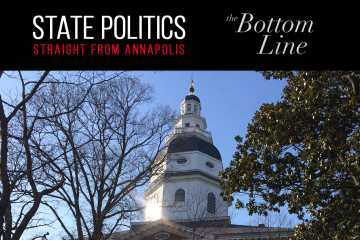Students Rally for Bernie Sanders at Town Hall Meeting
"Mock Caucus" held to debate presidential candidates
At a Town Hall meeting held on April 19, Frostburg State University students participated in a mock caucus, voicing overwhelming support for Vermont Senator Bernie Sanders, a candidate for the Democratic nomination for President of the United States.
The caucus was organized by the Office of Civic Engagement and The J. Glenn Beall Institute for Public Affairs. Students came out in support of their favored candidate and debated with one another, in hopes to convert other students to their side
Although Sanders supporters came out in droves, Democratic nominee Hilary Clinton and undecided voters also turned out in sizable numbers with about a dozen students and faculty members occupying both tables.
Republican candidate Donald Trump and Libertarian candidate Gary Johnson had smaller bases but supporters of both candidates were notably vocal during the debate. Supporters for Republican candidates John Kasich and Ted Cruz were virtually absent during the caucus and often had to be represented by the moderator, Tim Magrath, a lecturer in the political science department and executive director of the J. Glenn Beall Institute.
The caucus began with each group of supporters being asked to give their opening arguments for why they chose their candidate. Clinton supporters lauded her practicality and her track record as a Senator and as Secretary of State.
Sanders supporters voiced their skepticism over the future of the economy and agreed with Sanders’ plans to adopt “European economic values.” His supporters also advocated Sanders’ plans to redistribute more of tax payers’ money towards education instead of the military.
Johnson supporters praised their candidate for his integrity and self-reliance while Trump supporters touted his tax plan, which proposed a zero percent tax for people making under $25,000 dollars a year.
The first real debate in the caucus began when one of Sanders’ supporters praised the candidate for his support of closing the “gender pay gap.” Johnson supporters in particular vehemently argued against the notion of a pay gap. A Johnson supporter stated, “If you take factors from overall men and women, you’re going to get a pay gap, just like if you take factors from each race overall, you’re going to get a pay gap and that’s not because of discrimination, that is because of differences in majors and occupations.”
In defense of the notion of a pay gap, one student stated that his female professor, a Women Studies instructor, got paid less on average than male professors. Johnson’s supporters stated that it was merely because she taught a course that’s less valued than her male counterparts’ courses that she was paid less but Sanders supporters took issue with women-centric courses and careers being devalued.
One of the more impassioned parts of caucus came when discussing Donald Trump and his plans to build a wall and have Mexico pay for it. About forty minutes into the debate, an undecided student brought up Trump’s wall proposal. The proposal was met with skepticism and light mocking, with one student joking that Trump’s thirteen-foot wall would just result in a “fourteen-foot ladder.” The debate took a more serious turn when an undecided student strongly argued that “America was built off immigration,” which was met with a roaring response.
While Trump’s supporters too, questioned the practicality of the wall, they agreed with their candidate’s stance on illegal immigration. They defended Trump’s remarks by stating that illegal immigrants weren’t just taking jobs from U.S citizens but more importantly they were devaluing these jobs for others by taking barely livable wages. Their argument against illegal immigration became one more steeped in ethics than emotion.
“Yes, there are lots of good people that have come from overseas,” a Trump supporter argued. “However, the issue is that these people are coming here illegally and that is a crime. The difference is not having a law and having a law. Do we not enforce it or do we get rid of it?”
Clinton supporters were relatively quiet for the first hour of the Caucus. It wasn’t until Clinton’s truthfulness was challenged by an independent that the Clinton supporters finally engaged in the debate. Independents criticized her changing beliefs on gay marriage, her unwillingness to admit her resistance to gay marriage, and her 1996 “Super-Predators” comments, as well as the national security issues raised by her email controversy.
Clinton supporters, however thought that her changing beliefs were a positive for Hilary Clinton., appreciating her openness to new perspectives and ideas.
“Personally, I would love to have a president who learns and grows,” a supporter said. “I don’t want somebody who’s going to stick with an idea and issue because that’s what they’ve always believed.” Another supporter thought that her earlier comments on gay marriage were just a product of a less tolerant time in America.
Sanders still remained the most popular candidate among students at the end of night with nearly twenty students crowded at his tables. Surprisingly, the only candidate that was able to actually pick up several new surrogates at the end of the caucus was Libertarian candidate, Gary Johnson. Nearly every undecided student flocked to Johnson’s table thanks to the impassioned debating from his surrogates who noted Johnson’s success in leaving his state, New Mexico, with a billion-dollar surplus without raising taxes.





1 Comment